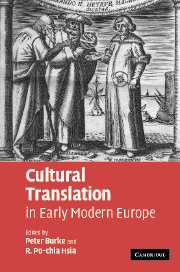Book contents
- Frontmatter
- Contents
- Notes on contributors
- Introduction
- PART I TRANSLATION AND LANGUAGE
- 1 Cultures of translation in early modern Europe
- 2 The Catholic mission and translations in China, 1583–1700
- 3 Language as a means of transfer of cultural values
- 4 Translations into Latin in early modern Europe
- PART II TRANSLATION AND CULTURE
- PART III TRANSLATION AND SCIENCE
- Bibliography
- Index
4 - Translations into Latin in early modern Europe
Published online by Cambridge University Press: 27 July 2009
- Frontmatter
- Contents
- Notes on contributors
- Introduction
- PART I TRANSLATION AND LANGUAGE
- 1 Cultures of translation in early modern Europe
- 2 The Catholic mission and translations in China, 1583–1700
- 3 Language as a means of transfer of cultural values
- 4 Translations into Latin in early modern Europe
- PART II TRANSLATION AND CULTURE
- PART III TRANSLATION AND SCIENCE
- Bibliography
- Index
Summary
It is well known that both spoken and written Latin were regularly employed in early modern Europe not only in the Catholic Church but also in the world of scholarship, diplomacy, the law and elsewhere. The importance of early modern translations from Latin into the vernacular languages of Europe has also been recognized. So has the importance of translations from ancient Greek into Latin.
On the other hand, translations from the vernacular into Latin have been relatively neglected. The reason for this neglect may be that the phenomenon seems to be counter-intuitive. After all, why should anyone want to make translations in the ‘wrong’ direction, from a modern language into an ancient one? Insofar as they have been studied at all, these texts, in particular the translations of literary classics such as Dante, Ariosto, Tasso, Cervantes, Camões or Milton, have been treated as curiosities, simple exercises of ingenuity.
However, I have discovered no fewer than 1,140 published translations of substantial texts by known authors between the invention of printing and the year 1799, and there may well be many more, especially of books published in Central Europe and not available in libraries further west. One day, when an on-line catalogue of all early modern European publications becomes available, these omissions will come to light.
The number of these translations testifies not only to the widespread knowledge of Latin at this time, but also to the fact that many educated people outside frontier regions found foreign vernaculars difficult if not impossible to read.
- Type
- Chapter
- Information
- Cultural Translation in Early Modern Europe , pp. 65 - 80Publisher: Cambridge University PressPrint publication year: 2007
- 8
- Cited by



